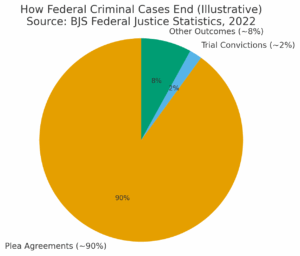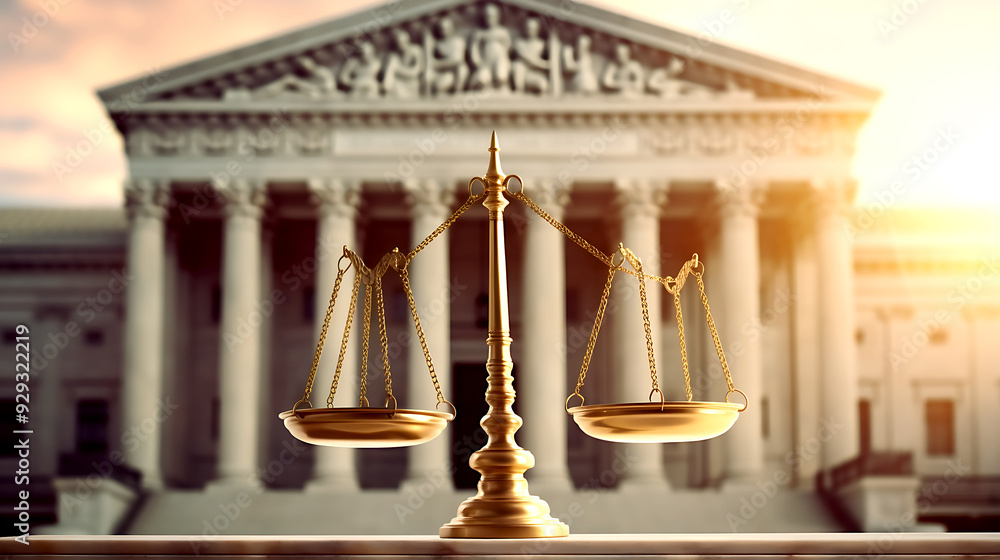What Is Criminal Conspiracy in Florida? Elements, Penalties, and Defenses
Short answer: In Florida, “conspiracy” means an agreement between two or more people to commit a crime, plus intent that it happen. Florida’s conspiracy statute (Fla. Stat. §777.04) can be charged even when the underlying crime never occurs—so long as prosecutors claim they can prove an agreement and intent.
Why prosecutors use conspiracy so often
- Lower threshold than many expect: Florida conspiracy focuses on the agreement and intent—sometimes without a completed offense.
- Leverage in negotiations: Conspiracy counts are frequently used to pressure pleas or co-operation.
- Multi-defendant reach: Texts, chats, and informants can pull many people into the same case if the State argues a shared plan.
Statistics that put “conspiracy” in context
- How federal cases end: About 90% of adjudicated federal defendants plead guilty; roughly 2% are convicted at trial (the rest are other outcomes). (Bureau of Justice Statistics, FY 2022)
- Florida trend signals: FDLE’s Uniform Crime Reports track statewide arrests (including drug offenses often paired with conspiracy), giving reporters and researchers a consistent time series for Florida.
- Federal guidance: DOJ’s Justice Manual details the elements of conspiracy under 18 U.S.C. §371 and offense-specific conspiracies—useful context when Florida cases have a federal angle.

Florida’s legal definition (plain English)
- Agreement: Two or more people agree to commit a specific crime.
- Intent: Each intended for that crime to happen.
- Overt act? Unlike some jurisdictions, Florida conspiracy can be charged even when the crime never occurs; proof of “agreement + intent” is the core battle.
Read our practice-area guide: Conspiracy Defense in Florida.
Common Florida conspiracy fact patterns
- Drug trafficking conspiracies tied to Florida’s weight thresholds (§893.135).
- Fraud schemes (insurance, health care/Medicare, wire/bank fraud).
- Organized retail theft and fencing operations.
- Public-corruption or bribery arrangements.
Focused resource: Orlando Drug Trafficking Conspiracy Lawyer.
Penalties & why exposure varies
Penalties track the underlying offense in most cases. Conspiring to commit a first-degree felony can mean decades in prison; a third-degree felony can still bring up to 5 years and a felony record. Add collateral consequences—employment, housing, licensing, immigration—and the stakes are obvious.
What the State must prove (and how we attack it)
- Real agreement: We challenge whether texts or conversations show a true “meeting of the minds” versus bragging, jokes, or loose talk.
- Intent: We undermine proof that you meant the crime to happen.
- Participation/knowledge: Mere presence or association isn’t enough; we push for severance when “spillover” prejudice is likely.
Winning early matters. Learn about targeted pretrial motions that change leverage.
State vs. federal conspiracy—key differences
- Florida: Charged under §777.04 (conspiracy); exposure mirrors the target offense (e.g., trafficking thresholds in §893.135).
- Federal: Often charged under 18 U.S.C. §371 or offense-specific conspiracies (e.g., 21 U.S.C. §846 for drug conspiracies), with guidelines, mandatory minimums, and broader discovery (wiretaps, multi-defendant indictments).
Why choose Fighter Law
Conspiracy cases are document-heavy and fast-moving. Our board-certified trial team treats your case like it’s going to verdict from day one—building leverage for the best possible outcome.
Start here: Conspiracy Defense in Florida or visit our Orlando Criminal Defense hub.
Florida Conspiracy FAQ
Is conspiracy a felony in Florida?
Usually, yes. The degree tracks the underlying offense (for example, conspiracy to traffic in cocaine can trigger minimum mandatories tied to drug weight).
Can the State charge conspiracy even if “nothing happened”?
Yes. Prosecutors focus on agreement and intent, not whether the offense was completed.
Can I be charged with conspiracy and the completed offense?
Often, yes. We evaluate double-jeopardy risks, evidentiary overlap, and pursue severance when a joint trial would unfairly prejudice you.
How do statistics help my defense?
Numbers from BJS/FDLE/USSC can help frame plea dynamics and reveal weaknesses in claims of continuity or enterprise—useful during negotiations and motion practice.
Need help now? Call 407-FIGHTER (407-344-4837) or contact us through our Conspiracy page.


